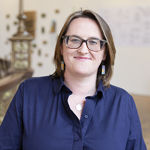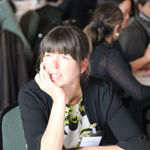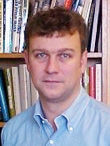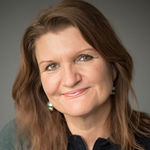We are working with our partners to tackle inequalities in all aspects of society, striving to make change for a fairer world and one in which people can enjoy a fulfilling, rewarding life.
Abortion law reform Ireland
After more than 30 years of activism, 25 May 2018 marked a significant historical moment as Irish people voted to repeal the 8th Amendment. This allowed the government to legislate for the provision of lawful abortion, which has now been available in the Republic of Ireland since 1 January 2019.
However, this alone was not enough to ensure the resulting law would put the rights of pregnant women and girls first, and comply with international human rights law. Research undertaken by Birmingham Law School academics informed the legislative reform process that changed one of the most restrictive abortion laws in the world into one that is largely respectful of pregnant people’s reproductive health decisions.
Birmingham Heroes: Fiona de Londras - working to reform abortion law

Professor Fiona de Londras
Professor of Law
“This decades-long reform movement has taken Ireland from having some of the world’s most restrictive laws on abortion to one that, while still limited and problematic, makes abortion available to most people who need it. Abortion needs to be decriminalised across the world, with pregnant people’s rights put at the centre of legislation. Repeal of the 8th Amendment in Ireland has given vital new energy to reproductive rights movements across the world, even while activists work tirelessly for the further improvement of the new law.”
Refugee integration – changing policy and practice
Over the past four decades, the number of refugees across Europe has grown, and is expected to increase further in the face of the ongoing refugee crisis. With many refugees arriving alone in countries that have unfamiliar cultures and languages, integration and welcoming communities are vital. Following a two-decade long programme of research, Professor Jenny Phillimore and Dr Lisa Goodson are challenging conventional integration policy and practice.
Professor Jenny Phillimore talks about how we can help refugees to integrate into our society more effectively.
The aim of refugee integration is to enable refugees to achieve their potential, protect their human rights, and foster social cohesion. For years, social integration has been the sole responsibility of refugees, but without networks, support, and welcoming communities, refugees can often be ostracised from society.
Research by Professor Phillimore and Dr Goodson has identified good practice – and uncovered elements of the current system that do not work – by working directly with refugees, civil society, and policy partners. Their research evidence has directly shaped the UK Home Office’s refugee integration policy, particularly the Indicators of Integration Framework, which is used to support 20,000-25,000 refugees annually.
Not only have outcomes from the project made a difference at a policy level, through ongoing conversation and engagement with communities, there have been enhanced benefits for refugee families, helping them to thrive within society. We continue to support policy reform to better support refugees through our research in sexual and gender-based violence amongst refugees.

Professor Jenny Phillimore
Professor of Migration and Superdiversity
“The ability of refugees to settle depends on many factors and especially the ways in which they are received by Government and society. Integration isn’t something they can do on their own. Integration processes can often be undermined when refugees aren’t welcomed, are excluded, or experience racist harassment. Finding welcoming communities, as well as communities of refugees with similar lived experience, is an integral part of the process, and helps them to resettle and meet their potential.”
New histories of homelessness
To better understand homelessness, Professor Nick Crowson undertook a research project into the hidden histories of homelessness in modern Britain, aiming to integrate the voices of the homeless into the narrative of homelessness in modern Britain. Professor Crowson’s work shows how it is now possible to trace the life stories of individual vagrants and, in doing so, cast light upon a forgotten section of society.
His work not only reveals who these people were, but where they moved around the country, explaining why they were in this predicament between late Victorian times and the inter-war years. His research has informed the work of NGOs, including Crisis, and has been referenced in the Scrap the Act campaign, calling for the 1824 Vagrancy Act which criminalises homelessness to be scrapped, which the government has now committed to do.
Professor Crowson’s work also led to a collaboration with Cardboard Citizens, a theatre company who work with homeless people, to deliver a series of theatre productions to bring to life some of the historical characters from Professor Crowson’s research, as well as Every Person Wandering, a radio play broadcast on BBC Radio 4 in early 2022.
Professor Nicholas Crowson discusses new histories of homelessness in modern Britain

Professor Nick Crowson
Professor of History
“The lived experiences of homeless people throughout history have often been forgotten in a way that has a real impact on how society views them, and how policies are shaped around them, today. This project has been able to deliver real impact by informing the campaign to scrap the 1824 Vagrancy Act, and in bringing new understanding to the experiences of homeless people throughout history and today.”
Transforming education for autistic children
There are over 120,000 autistic pupils in England’s schools, of which over 70% are educated in mainstream settings. Children and young people with autism are three times more likely to be regularly and unlawfully excluded from school than those without special educational needs, leading to further isolation from peers and society. The Autism Centre For Education and Research (ACER) is challenging the prevalent misconceptions around autistic children and young people.
Terri and Sophie talk about their journey with Autism
The research of ACER is offering knowledge of autism to staff in education settings, supporting them to steer away from generalist understandings of what makes for ‘good’ education of autistic students.
ACER has developed a distinctive framework, which is a key component of the Autism Education Trust’s (AET) continuing professional development programme. The framework provides a set of autism standards (which allows for education settings to assess autism practice), an autism competency framework setting out guidance on what is needed by practitioners, and training for educators.
The work of the Centre has transformed how education stakeholders nationally and internationally understand autistic children and young people, and developed the eight principles of good autism practice, setting the standard nationally.

Professor Karen Guldberg
Professor of Autism Studies
“Autism is complex and impacts daily functioning. Therefore, autistic pupils need distinctive and personalised support to help them succeed in school. Education staff need professional development to develop better understandings, attitudes towards, and classroom practice for autistic pupils. Pupil-centred approaches are changing the face of autism education, and a better informed research-based framework ensures that no student is left behind.”
Find out more about ACER’s work on autism studies as part of our Unfiltered Lives campaign.
Children born of war
Children Born of War (CHIBOW) is a research network aimed at enhancing our understanding of the challenges experienced by children born of war rape. The changing nature of war, the strategic use of rape as a weapon of war and increased conflict-related forced migration have led to rising numbers of children born of war rapes.
By combining historical, social, empirical, psychiatric, political, legal, memory, public health and development studies with the discourse surrounding currently enacted humanitarian intervention, insights gained from this network have surpassed existing knowledge and helped improve on current integration efforts.
CHIBOW - Children Born of War - Past, Present and Future

Professor Sabine Lee
Professor of Modern History
“This project is as much about progressing our knowledge about the experiences of children born of war, as it was about training a generation of international and interdisciplinary researchers, as it was about participatory approaches that allowed children born of war themselves to shape the research agenda, and the dissemination of new knowledge to their own home communities and beyond.”
Transforming social inclusion and wellbeing of homeless young people
Every year, over 130,000 people aged from 16 to 24 present as homeless or at risk, with many more not counted in official statistics. They are the age group that is most likely to be homeless, with the majority asked to leave by their parents, and many driven out by violence or abuse.
A team of Life and Environmental Science reserchers, led by Professor Jen Cumming, has developed and implemented a mental skills training programme, My Strengths Training for Life™ (MST4Life™), which has improved well-being and increased employability outcomes for young people who are homeless or at risk for homelessness. MST4Life™ has been adopted by a large Housing Service, leading to increased income and enhanced workforce planning and staff training standards. MST4Life is recognised as good practice by Public Health England, it has influenced policy and commissioning at local and national levels, and has been delivered to over 600 homeless young people with high/complex needs.
UAM 2020: Making a Positive Change in Youth Homelessness
Find out more about the impact the social inclusion and well-being of homeless young people.
Changing the Public Service Workforce
There are five million people working for the public sector in the UK. In recent decades, the context of public service delivery has been transformed by sustained austerity, increased localisation, and great demands for service user voice and control. Work being carried out by Professor Catherine Needham is changing public understanding of what a good public servant is.
With changes to public services, what does the future of a public servant look like? Research from Professor Catherine Mangan and Professor Catherine Needham explores the changing nature of the role.
Through interviews with those working across a wide range of public services in England, the ‘21st Century Public Servant’ framework has been developed. This framework identifies ten key characteristics associated with the 21st century public service worker and challenges organisations to consider how to adapt practice to meet current and future needs.
This work has influenced the concept of what a good public sector leader is, and how they are developed and trained. The model put forward by this research has been taken up as best practice nationally, with a move from reliance on technical skills to softer skills. This shift will not only change the provision of services, but also give voices of influence to those public servants who may have previously been unheard.
The Local Government Association (LGA) has become a champion for the 21st Century Public Servant, describing it as ‘a blueprint — looking at skills, values, and identities of the future public service workforce’.
Find out more about the 21st Century Public Servant framework.
Transforming higher education for people with vision impairment
In England, there are over 30,000 children and young people with vision impairment, with many experiencing poor educational outcomes and social exclusion. Although specialist educational services in the UK are required to support those with vision impairment to the age of 25, employment statistics consistently highlight poor outcome for those with vision impairment, with just 30% finding paid work.
Unfiltered Lives - Hasun
As part of their work, VICTAR has worked closely with young people with vision impairment by listening to their stories and collecting evidence to provide a better understanding of what is working well and what needs to improve.
This research is helping give this population a stronger voice in society; by informing national policy on higher education access, changing current services in post-school transition and by informing the work of a range of practitioners.
VICTAR has worked closely with a number of charities, organisations and policy makers. Working with Thomas Pocklington Trust, a charity which helps people with vision impairment to live better lives, together they have developed major national campaigns and support resources, which have increased the awareness of the experiences of young people with vision impairment and led to work with the Minister of State for Universities, Science, Research and Innovation and Steve McCabe MP.
Find out more about the work of VICTAR in our Unfiltered Lives campaign.